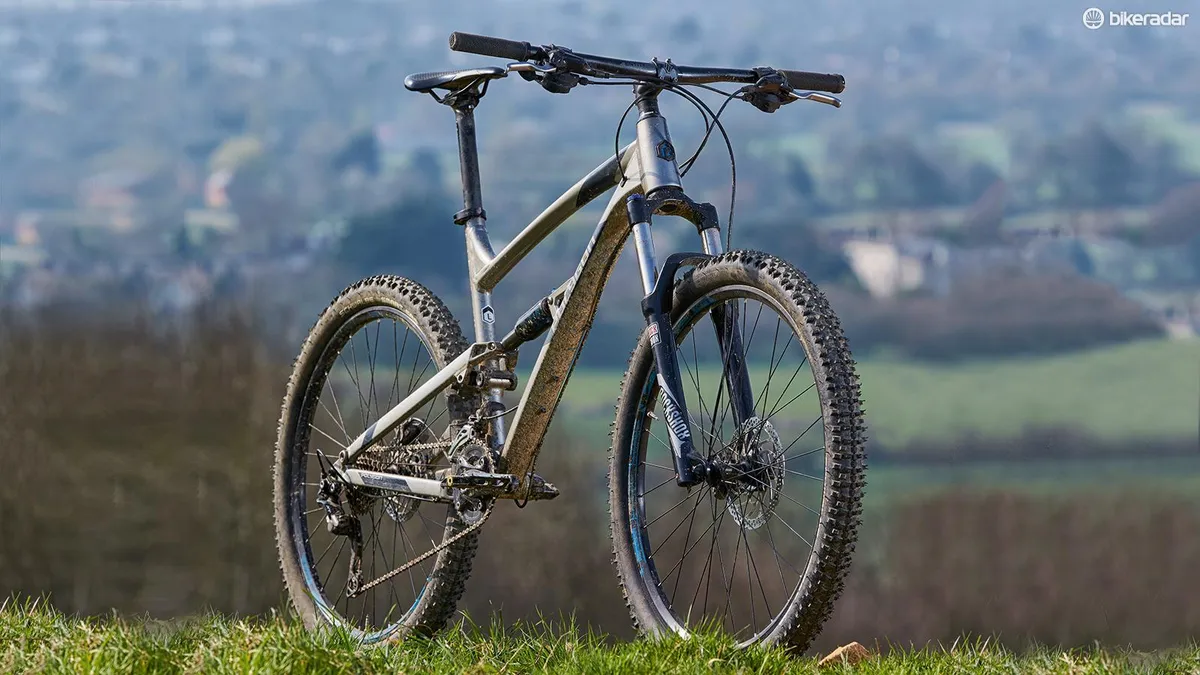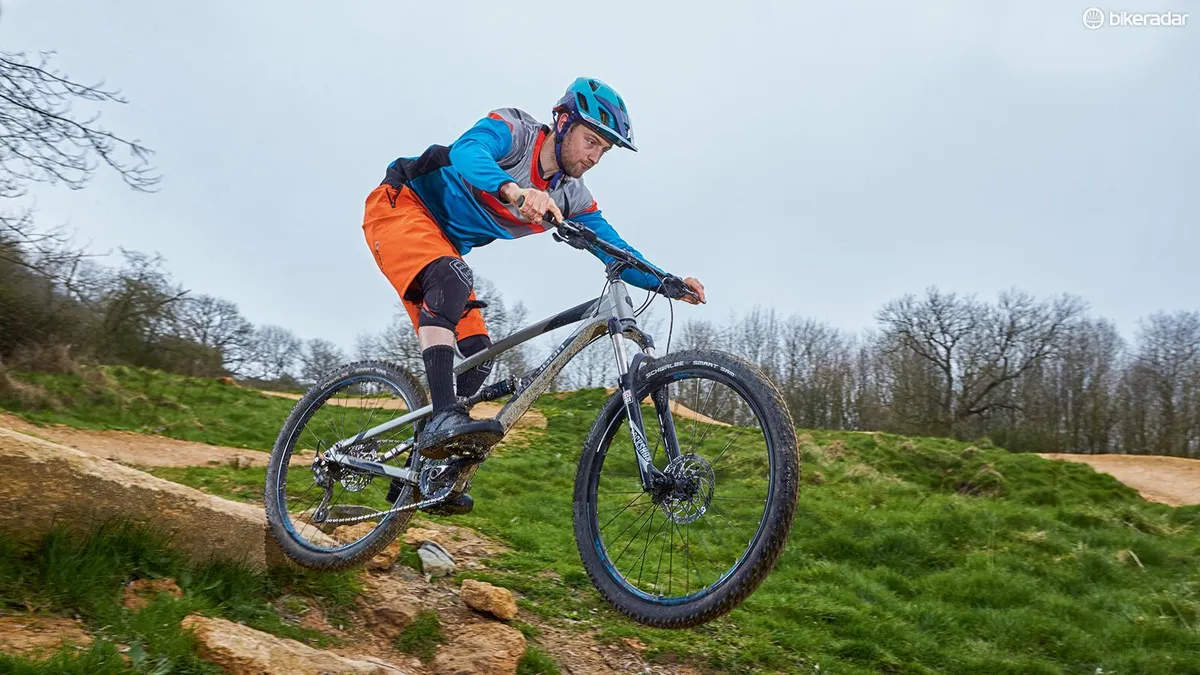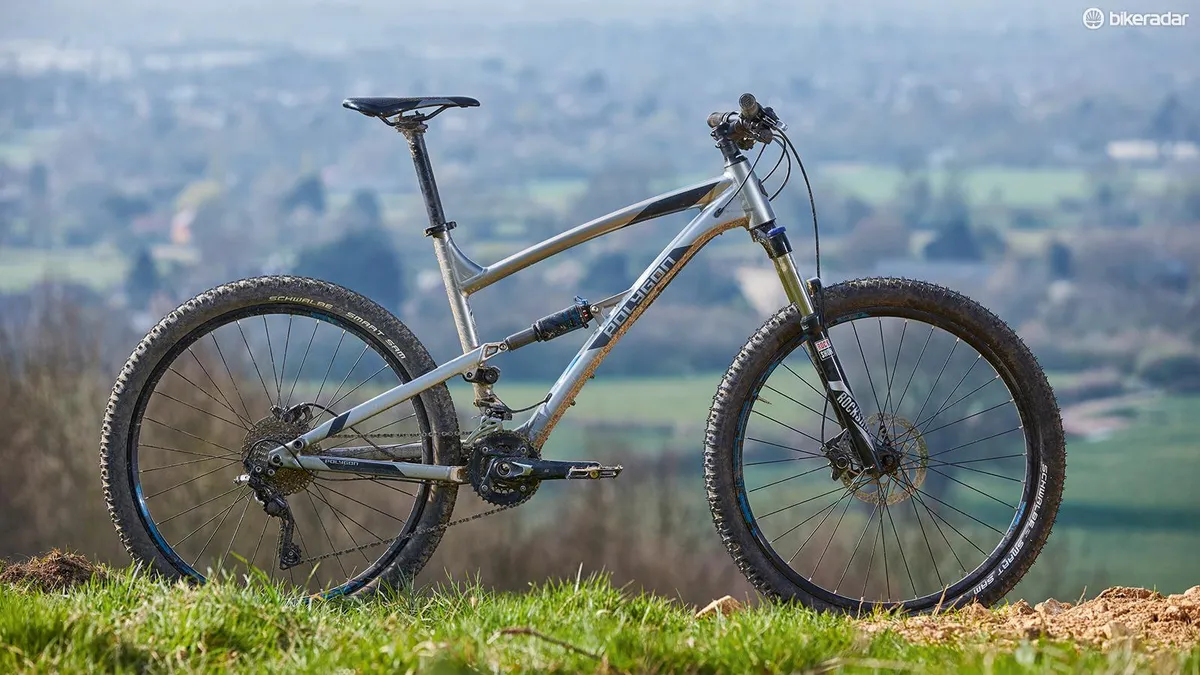Polygon’s price-beating full-susser has enough tweaks, treats and frame performance to ensure the dodgy fork isn’t a deal-breaker.
The Siskiu’s lean, low-slung looks sketch out balanced all-round geometry, while the short linkage and chunky pivot terminals on the back end keep it tight under torque. I’d expect the external bottom bracket to last far longer than an internal unit. There’s a skinny QR out back, not a thru-axle, but the dropouts can be upgraded to 142×12mm if you get the wheels to match.
Even at £1,300 / $1,199, the QR-equipped RockShox 30 fork is disappointing, but the rest of the package is pretty good.
The Shimano XT rear mech with clutch switch is a big practical advantage, Deore cranks are a good choice and the M365 brakes use the same levers as the M315s on the Giant Trance 4, which was also on test, but get upgraded calipers. While the lock-on grips look like a nice detail too, they twist in the wet.
Polygon Siskiu D7 ride impression

While the D7's 67.5-degree head angle might seem a little short when compared to similar bikes it is on point for the purpose and travel (120mm) of the bike. Because the UK importers have taken the smart step of fitting a 55mm stem instead of the 80mm number listed on Polygon’s website, the Siskiu feels keen, responsive and ready to play through tight corners and random traction situations straight away.
While the budget doesn’t stretch to a dropper post, the frame is ready for an internally routed unit as soon as you have the funds. Polygon has helpfully fitted a QR seat collar, so dropping the saddle manually is easy.
The 74.5-degree seat angle naturally puts you further over the front wheel and in command when you’re seated for climbing or pedalling. It also makes the saddle easy to get behind if — actually let’s be honest, when — you need to lift the front wheel and keep it out of trouble.
You’re going to need to do this quite a lot, because of the fork. The RockShox 30 feels smooth enough when you’re pitter-pattering over the roots, ripples and gravel of a fireroad, woodland walk or blue-graded MTB trail, but start pushing it harder through turns or adding some braking load into the skinny 30mm-stanchion chassis, and the flex instantly chokes the stroke.

Even the plasticky Schwalbe tyres can add enough grip to twist the QR steering out of shape, and with stickier rubber installed, the wheel-to-bar dislocation is remarkable in all the wrong ways. That creates a front end that has you flinching as soon as rocks or drops appear, and I had countless near-miss steering moments.
Although that sounds pretty damning, the saving of the Siskiu is that the rest of the bike works really well. While the Epixon shock feels wooden and unyielding for the first couple of hours, after a few more rides it opens up to deliver a fluid stroke that doesn’t noticeably disturb pedalling.
It handles mid-size hits acceptably for a budget bike too, so the fact that the back end has to take the brunt of the impact load because the fork can’t be trusted isn’t an issue. Don’t underestimate the psychological effect of the chain-quietening clutch on the rear mech too, which makes things sound as well as feel a lot more controlled.
While I’d recommend changing the hard-compound Smart Sam tyres if you’ll be heading into wet woods regularly, there’s no denying that the centre-ridge tread rolls really fast. Contrary to expectations, the sharp intermediate and shoulder knobs bite into slop pretty well and clean immediately too.
As long as you stay off the shiny roots and green rocks, the supple but not distracting initial suspension movement makes the Polygon a surprisingly tenacious climber and easy, enjoyable day rider. Especially if you upgrade to a new fork as soon as possible.

